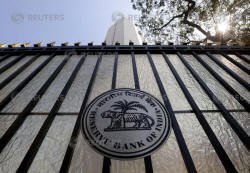As India looks for new central bank head, investors
worry about independence
 Send a link to a friend
Send a link to a friend
 [December 11, 2018]
By Suvashree Choudhury and Neha Dasgupta [December 11, 2018]
By Suvashree Choudhury and Neha Dasgupta
MUMBAI/NEW DELHI (Reuters) - Reserve Bank
of India (RBI) Governor Urjit Patel's shock resignation following a
policy tussle with the government sent tremors through financial markets
on Tuesday, and investors are keen to see the government quickly name a
credible replacement.
Both foreign and domestic investors say any openly political appointee
with little macro-economic experience, would not sit well in equity,
currency and debt markets that have already sold-off following setbacks
suffered by Prime Minister Narendra Modi's Bharatiya Janata Party in
state polls this week.
Investors worry the government will use the central bank to do its
short-term bidding to boost the economy for political reasons, with a
general election due by May, without fully considering the long-term
consequences for inflation and financial stability.
Patel announced his resignation on Monday, after India's financial
markets had closed.

Among the candidates close to Modi and being touted by government
officials is Hasmukh Adhia, who retired as finance secretary in
November.
He led Modi's most controversial policies - the abolition and
replacement of high-value bank notes in an attempt to crack down on
black money, and the introduction of a nationwide goods and services
tax.
(See a list of possible candidates below.)
"Governor Patel's resignation leaves many open questions," said Mitul
Kotecha, senior emerging markets strategist at TD Securities. "Any hint
of an overtly political appointee will likely not bode well for India's
markets over the medium term."
The rupee touched a nearly one-month low against the U.S. dollar on
Tuesday.
Following Patel's announcement, forward contracts tracking the rupee
against the dollar posted their biggest fall in more than five years.
Bond and equity markets also sold off sharply early in the day on
Tuesday, before turning around later.
The timing of Patel's resignation, along with the likelihood of losses
for the BJP in the five state elections, may spell trouble for foreign
investors who have been upbeat about India's long-term prospects with
Modi at the helm.
"We will have to see how much recovery the government can make by
general elections next year," said Ai Fujiwara, senior fund manager at
Eastspring Investments. "Indian markets will likely remain volatile for
now."
Former RBI Governor Duvvuri Subbarao echoed investors' concerns in
comments to CNBC-TV18.
"The government will have to do some deliberation and serious
introspection," Subbarao said.
"The next incumbent governor will of course have the task of restoring
the credibility of the RBI and entering into a working arrangement with
the government which does not give the impression of being influenced
beyond acceptable levels by the government."
These are some of the people being discussed as possible candidates to
replace Patel:
HASMUKH ADHIA:
Adhia, 60, retired as finance secretary in November. He was viewed as
close to Modi and known as someone handpicked by Modi to spearhead the
government's most controversial move to date to abolish high-value
banknotes, the so-called demonetisation.
He also served as principal secretary to Modi from 2003 to 2006, when
Modi was chief minister of Gujarat state.
Adhia was at the front line of investors' ire after a botched
implementation of the nationwide goods and services tax in 2017. Critics
said its complexities drove many small enterprises out of business and
cost hundreds of thousands of people their jobs.
[to top of second column] |

The Reserve Bank of India (RBI) seal is pictured on a gate outside
the RBI headquarters in Mumbai, India, February 2, 2016.
REUTERS/Danish Siddiqui/File Photo

He was also criticized for implementing a tax on long-term capital gains that
sent the stock markets tumbling. Widely known for his proximity to the top ranks
of the BJP, the Gujarat-cadre bureaucrat moved to the finance ministry in 2014,
months after Modi became prime minister.
SHAKTIKANTA DAS:
Das, 61, is former finance secretary and currently a member of the federal
finance commission, and one of India's serving G20 representatives. He was
widely perceived to be a contender for the top job at the RBI after the exit of
former governor Raghuram Rajan in 2016.
He previously served on the central bank's board. Das came under fire for his
pro-demonetisation stance and he was the most visible and vocal bureaucrat at
the time Modi withdrew the high-value bank notes in 2016.
Last year, Das criticized the methodology of global rating agencies and sought a
sovereign rating upgrade. Das has worked extensively in the budget division
under both Modi's government and the previous coalition led by the Congress.
SUBHASH CHANDRA GARG:
Garg, 58, the economic affairs secretary, was among the most outspoken in
defense of the government as tension with the RBI were building up over
governance and banking issues.
He called for more liquidity for the troubled shadow banking sector and also
questioned the RBI's governance structure. Garg also waded into controversy for
undermining the central bank's autonomy with his suggestion that India needed an
independent payment regulatory board.
Perceived to be the finance ministry's most staunch defender of its fiscal path,
he has for months played down fears of a weakening rupee and steered attention
to the RBI's forex reserves as firepower to defend against any currency
volatility.
SANJEEV SANYAL:
Sanyal is principal economic adviser to the finance ministry. An Oxford alumni,
Sanyal represents India in several international forums and is the co-chair of
the framework working group of the G20.

Sanyal, who quit as managing director and global strategist at Deutsche Bank in
Mumbai in 2015 to join Modi's finance ministry team, has worked in financial
markets since the mid-1990s.
He has been closely involved in the bankruptcy reform process in his current
role in the finance ministry. Sanyal has written several books on Indian history
and geography.
RAKESH MOHAN:
Mohan, 70, had two stints as a deputy governor of the RBI. He has also served as
secretary at the department of economic affairs in the finance ministry, and
held positions at the International Monetary Fund.
He has previously been in charge of monetary policy, financial markets, economic
research and statistics at the RBI. Mohan has written three books on urban
economics and development, along with two on monetary policy.
Mohan, who has a PhD in economics from Princeton, teaches at Yale University as
a senior fellow at the Jackson Institute for Global Affairs.
(Reporting by Suvashree Dey Choudhury and Neha Dasgupta; Additional reporting by
Karin Strohecker and Sano Hideyuki; Editing by Euan Rocha and Martin Howell)
[© 2018 Thomson Reuters. All rights
reserved.] Copyright 2018 Reuters. All rights reserved. This material may not be published,
broadcast, rewritten or redistributed.
Thompson Reuters is solely responsible for this content. |